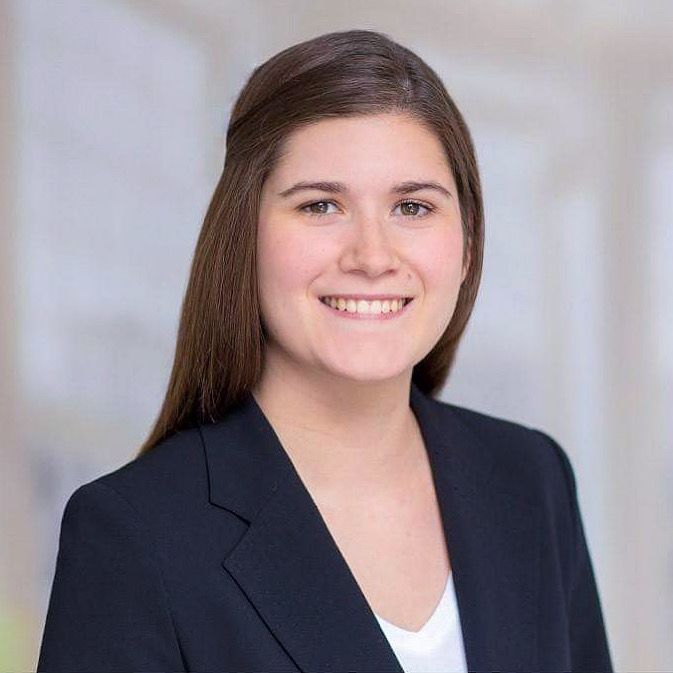
Lina works as a lawyer at Fieldfisher LLP in Hamburg and is a EULISP graduate of the 23rd year with a semester abroad at the University of Strathclyde in Glasgow, Scotland.
03.05.2021 – Interview
Dear Lina, you successfully completed the EULISP in 2017/2018. What was your original motivation to apply for the EULISP?
In fact, my interest in IP/IT law was already aroused in my first semester. At that time, Prof. Axel Metzger had presented the then still new LL.B. programme on IT and IP law. And since I had only enrolled in the regular law degree programme at that time, I already saw it as an exciting opportunity to acquire a specialisation early on. The introductory lecture initially presented classic examples from trade mark and design law, for example, the “Megablocks” decision and various other things that were very tangible, so that I decided to enroll in the LL.B.. Also, before the EULISP, I studied abroad for a year during the LL.B. and I thought that I would like to take the chance again to get in touch with international students, spend another half a year abroad and thereby deepen the areas of law that I really enjoy.
Looking back, which EULISP contents did you enjoy the most? And which new topics do you think would be suitable for integration into the curriculum?
Since I am very interested in IP law topics, I found the trademark law issues, but also the events on copyright law, very exciting. In IT law, on the other hand, I liked the questions on the legal classification of artificial intelligence (AI) and machine learning, which is why I also wrote my Master’s thesis on the ownership of machine data. Today, I am still particularly interested in AI and the related topics, which could also be covered in more depth in the EULISP. I also believe that AI will play an increasingly important role in the future, including in copyright law. For example, how do you deal with works created by AI?
A unique selling point of the EULISP is its focus on European legislation in the area of IT law. Did the initiators of the EULISP get a lot right here? Or would you perhaps have wished for more references to German law?
I actually thought it was just right the way it was, especially that there were far more lectures in English than in German. I believe that this is very good for the reputation of the EULISP, as German LL.M.s are still considered less valuable than LL.M.s obtained abroad, as they cannot be used to prove foreign language experience. In this respect, the EULISP does a lot right. In addition, there were also some lectures with references to German law that could possibly be held in English to give international students without knowledge of German an insight into German law.

© Lina Josephine Ganseforth 
© Lina Josephine Ganseforth
What memories from your first EULISP semester in Hanover have stayed with you the most?
On a professional level, I remember the EULISP seminar with many exciting lecture topics very well. On a social level, I really enjoyed the tour at the Herrenhäuser Brewery. It was a lot of fun to be able to show those who were not from Hanover or not from Germany a classic brewery tour at the Herrenhäuser Brewery (“Herri”). The Christmas market visit was also very, very nice. The social programme at EULISP was generally excellent.
Lina, you completed your second EULISP semester at the University of Strathclyde in Glasgow. Why did you choose Scotland and the University of Strathclyde?
The main reason was that I wanted to study abroad again in an English-speaking country to improve my professional English. I had also read up on the subject beforehand and found out that the University of Strathclyde offers a whole range of good lectures on IT law.
That brings me directly to my second question. What subjects or content related to IP and IT law were you taught in Scotland?
Firstly, media law, especially telemedia. That was quite an exciting and unusual lecture, which was held online. For the performance review, written assignments were to be submitted each week. At first, we found it a bit hard to get used to, but in retrospect it turned out to be quite good preparation for Corona. In addition, there was a classroom lecture on European copyright law. In Scotland in particular, the lecturers tend to be Europe-friendly and are keen to teach the EU law content comprehensively. We had to write essays at the end of the semester, which is a fundamental characteristic of legal education in the UK.
Apart from the content of your studies, what did you like best about Scotland and what do you remember most about it?
Definitely the Highlands! The nature was really impressive. We used every weekend to explore Scotland, whether it was a full weekend on the Isle of Skye or just a day trip to Loch Lomond or Edinburgh. Besides that, I really liked the pub culture, as this culture of getting together in pubs has declined more and more in Germany; which is a pity. Pubs in Scotland, or in Great Britain in general, are social meeting places where people eat and drink and have relaxed conversations with each other.

After the EULISP, you started your legal traineeship (Referendariat) in Hanover. Did the training content of the EULISP influence your choice of stations during your traineeship?
Very much so! In the first two stations at court and in the public prosecutor’s office, of course less so, but in the administrative station I went to the German University of Administrative Sciences in Speyer and deliberately chose courses that concerned the digitalisation of administration. In the lawyer’s station, I was already able to gain insights into legal work in the areas of trademark and competition law at Taylor Wessing in Hamburg. And in the elective station, I finally ended up at the Federal Ministry of Education and Research, more specifically in the department for “Ethics and Law; Framework for Digitalisation”, which was increasingly concerned with science-friendly copyright law and the regulation of AI. By the way, I always got positive feedback about the EULISP when I applied for my traineeships – and also for starting my career.
Since successfully completing your second state examination, you have been working as a lawyer at Fieldfisher in Hamburg, where you deal with issues of private media law, with a further focus on the law of expression and press law. Can we assume that the EULISP training content is part of your daily work here?
Yes, of course very much. In abstract terms, my colleagues and I are always close to current legal issues that are significantly influenced by EU legislation in copyright law or IT law. In this respect, the EULISP has provided me with the essential starting conditions that enable me to quickly familiarise myself with the relevant areas of law and to integrate current, new legislation from Brussels into the already existing legal system. My knowledge of English, which I was able to refine and put to practical use during my time in Glasgow, is also now benefiting me greatly in my daily work.
In conclusion, how would you classify the EULISP in terms of its importance for your personal life?
The EULISP has decisively strengthened my current career choice and is a real quality feature of legal education in IP and IT law in informed professional circles. Of course, this is also due to the fact that the EULISP is the oldest and most comprehensive postgraduate programme in these fields and, to my knowledge, still the only one to place such a consistent focus on European law in this area.

© Lina Josephine Ganseforth 
© Lina Josephine Ganseforth
